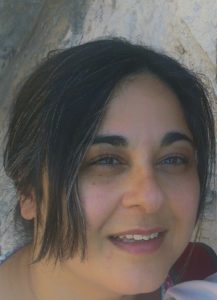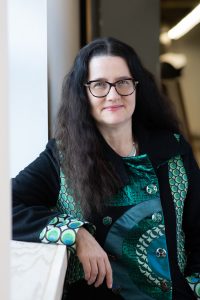What We Inherited opens today with author Priya Sharma‘s answer to my question about what a phrase like “lesbian-themed story” might mean in 2017: I think there’s lots of experiences under the umbrella term of “lesbian themed fiction” that have yet to be written about, from a whole load of different cultural and social perspectives. It’ll be exciting to read about those experiences.
I’ve asked Priya here as part of my series of interviews about the Heiresses of Russ 2016 anthology and her story, “Fabulous Beasts,” which originally appeared on Tor.com in July of 2015.
What do you think we achieve by categorizing stories, tagging them with qualities that highlight sexuality (or gender, ability, and race) ? Is it a desired end point? A necessary stage on some collective journey humanity is taking?
I think it’s a step in the process of inclusion. If tagging a story brings that element into public consciousness and means recognition and debate around it, that’s good. The end point? People just wanting great stories that celebrates our differences and similarities. Is that naïve?
Ultimately I don’t want to be read because of my gender, sexuality or race, or because my writing features certain themes. I want readers to trust my abilities as a storyteller.

author Priya Sharma
Would you say your story in the collection is typical or emblematic of your work, or an outlier?
I hope it’s typical for me in that character is key. Characters aren’t window dressing or vehicles. When I write, my characters drive the plot. When they’re not vivid enough to tell me what they like and don’t like, whether they’re gay or straight, what they’d kill or die for, then my writing is at its weakest.
If you were to pick stories for a historical overview–Best Heiresses of Russ of the Previous Century, that sort of thing–what would be the first story you’d seek out?
Writers that have hugely interested and influenced me are Jeanette Winterson and Sarah Waters because of the excellence of their writing. They tackle the human experiences of love, death, power, personal mythology, subjugation and freedom head on. It would be something by them.
One of my previous interview series, The Heroine Question, generated some interesting discussion of the gendered term Heroine. What do you think of Heiresses of Russ as a title for this project? Should it be Inheritors or Heirs?
I’ve just read all the answers to The Heroine Question and enjoyed the varying viewpoints on the use of heroine vs. hero. I loved Juliet Mckenna’s comment about women not needing to be “faux-male” to be heroic and Louise Marley statement that being feminine is to be celebrated. However, I hope we’re redefining the words hero and heroine for the 21st century for both women and men. Heroic acts are genderless and not necessarily about physical strength. I personally prefer protagonist as it doesn’t have the shining qualities as a hero. Real people are more complex and fucked up than that.
I have no issue with “Heiresses of Russ”. Heiresses doesn’t have the same baggage that heroine does, or at least it doesn’t for me.
What are you working on now?
I’ve got a new story included in Ellen Datlow’s “Black Feathers” (called “The Crow Palace”) which is out in Feb 2017. I’m currently writing some original stories for my collection.
Priya Sharma’s fiction has appeared in Albedo One, Interzone, Black Static and on Tor.com. She’s been anthologised in several of Ellen Datlow’s Best Horror of the Year series, Paula Guran’s Year’s Best Dark Fantasy & Horror series, Jonathan Strahan’s The Best Science Fiction & Fantasy 2014, Steve Haynes’ Best British Fantasy 2014 and Johnny Main’s Best British Horror 2015.
Her story “Fabulous Beasts” appeared on Tor.com, was nominated for a Shirley Jackson Award, and won a British Fantasy Award.
About this interview: 2016 marked my debut as an editor, with the Lethe Press anthology Heiresses of Russ 2016. I co-edited with the capable and lovely Steve Berman; our Table of Contents announcement is here. At that time I asked some of my contributors if they’d be interested in talking a little about the ideas behind their stories, about the idea of lesbian-themed genre fiction, or anything else that seemed interesting and relevant. These are their replies.












